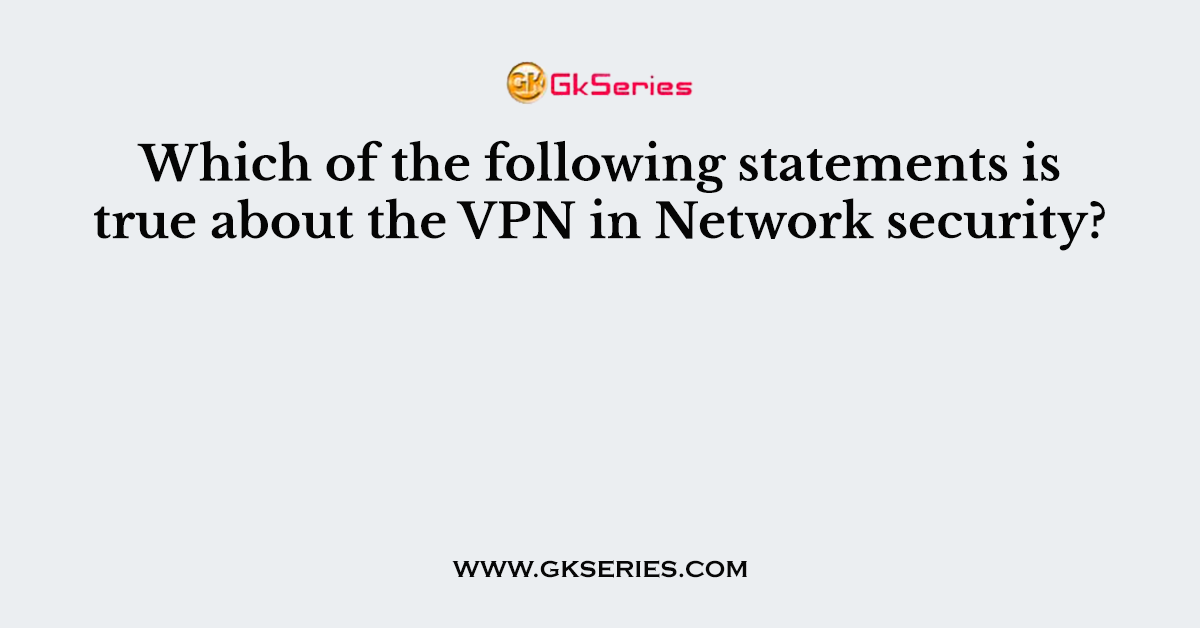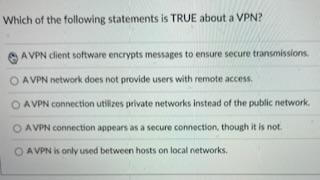Looking for the truth about VPNs? Wondering which statements are actually true regarding a VPN? You’re in the right place! We’ll dive into the world of VPNs to uncover the facts and debunk the myths. So, without further ado, let’s start unraveling the mysteries surrounding VPNs!
Now, you might be wondering, “What’s a VPN?” Well, a VPN, or Virtual Private Network, is a powerful tool that can enhance your online security and privacy. It creates a secure, encrypted connection between your device and the internet, making your online activities practically invisible to prying eyes.
But hold on, I can hear you thinking, “What are the true statements about VPNs?” Don’t worry, we’re going to shed some light on that! Stay tuned as we uncover the truths about VPNs and help you understand why they’re so crucial in today’s digital world. Let’s get started on this VPN journey together!
When it comes to VPNs, it’s important to know the true statements regarding their functionality. VPNs provide secure and encrypted connections, protecting your online privacy and data. They allow you to bypass geo-restrictions and access blocked content. VPNs can also hide your IP address, making you anonymous online. Additionally, VPNs can be used on multiple devices and offer different protocols for enhanced security. Stay informed about these true statements regarding VPNs to make the most out of this powerful tool.
Which of the following statements is true regarding a VPN?
Welcome to our comprehensive guide on VPNs, where we will debunk common myths and reveal true statements about these essential tools for online privacy and security. In this article, we will delve into the world of VPNs and provide you with expert insights and information to help you navigate this often confusing terrain. Whether you’re a newbie or a seasoned VPN user, we’ve got you covered. So, let’s dive in!
How Does a VPN Work?
One of the true statements regarding a VPN is that it creates a secure and encrypted connection between your device and the internet. When you connect to a VPN server, all your internet traffic is routed through an encrypted tunnel, which prevents anyone from intercepting or monitoring your online activities. This ensures that your data remains confidential and protected from prying eyes.
Furthermore, a VPN also masks your IP address, providing you with a new virtual location. For example, if you’re in New York but connect to a VPN server in London, websites and online services will see you as browsing from London. This allows you to bypass geo-restrictions and access content that may be restricted or unavailable in your actual location.
Additionally, VPNs also protect your data when using public Wi-Fi networks. These networks are often unsecured and can be exploited by hackers to intercept your sensitive information. By using a VPN, all your data, including passwords, credit card information, and personal details, are encrypted and secure, shielding you from potential cyber threats.
Common Myths About VPNs
Now that we’ve covered how VPNs work, let’s debunk some common myths surrounding them:
Myth 1: VPNs Slow Down Your Internet Speed
One of the false statements regarding VPNs is that they significantly decrease your internet speed. While it is true that connecting to a VPN may result in a slight speed reduction, modern VPN technologies have made significant advancements in minimizing this impact. In many cases, the reduction in speed is negligible and doesn’t hinder your browsing or streaming experience. It’s important to choose a reputable VPN provider that offers high-speed servers for optimal performance.
Additionally, the benefits of using a VPN, such as enhanced privacy and security, far outweigh the minor inconvenience of any potential speed reduction. So don’t let the fear of slower speeds deter you from utilizing this essential tool.
Myth 2: VPNs Are Only for Tech-Savvy Individuals
Another false statement is that VPNs are complicated and only suitable for tech-savvy users. In reality, most VPN providers offer user-friendly applications that are intuitive and easy to set up. You don’t need to be an IT expert to use a VPN effectively. With just a few clicks, you can connect to a VPN server and ensure your online activities are protected.
Furthermore, many VPN providers offer comprehensive customer support to assist you with any setup or troubleshooting. They often provide detailed guides and resources to help you navigate the process effortlessly. So, don’t let the misconception of complexity prevent you from enjoying the benefits of a VPN.
Myth 3: VPNs Are Illegal
A common misconception is that VPNs are illegal. However, the truth is that using a VPN is legal in the majority of countries. VPNs are legitimate tools used by individuals and organizations to enhance their online privacy and security. However, it’s important to note that every country has its own laws and regulations regarding internet usage, so it’s advisable to familiarize yourself with the legalities of VPN usage in your specific jurisdiction.
While there are certain countries that have restrictions on VPN usage or ban them outright, these cases are relatively rare. In most cases, using a VPN for personal use is perfectly legal and within your rights as a user.
Myth 4: All VPNs Are Created Equal
False! Not all VPNs are created equal, and choosing the right VPN provider is crucial for an optimal experience. When selecting a VPN, it’s important to consider factors such as their privacy policy, security features, server locations, speed, and customer support. Some VPN providers may log your online activities, defeating the purpose of using a VPN for privacy. Look for providers that have a strict no-logs policy.
Furthermore, reliable VPN services offer a wide range of server locations, allowing you to access content from different regions seamlessly. The speed of the VPN servers is also a crucial factor to provide smooth browsing and streaming experiences. Lastly, excellent customer support is vital if you encounter any issues or need assistance with the VPN service.
Myth 5: VPNs Are Expensive
Contrary to popular belief, VPNs don’t have to break the bank. While some premium VPN services may have higher price tags, there are plenty of affordable options available that offer excellent features and performance. Many VPN providers offer different pricing plans, allowing you to choose the one that best suits your needs and budget.
Additionally, keep an eye out for discounts and promotions that VPN providers may offer. It’s not uncommon to find special deals and coupons that can significantly reduce the cost of VPN subscriptions. Remember, investing in a VPN is an investment in your online security and privacy, making it well worth the price.
“Key Takeaways – Which of the following statements is true regarding a VPN”
- A VPN is a virtual private network that allows secure and private browsing on the internet.
- A VPN encrypts your internet traffic, making it unreadable to anyone who might try to intercept it.
- A VPN can hide your IP address, making it difficult for others to track your online activities.
- A VPN can bypass geo-restrictions and allow access to blocked websites and content.
- A VPN can be used on various devices, such as computers, smartphones, and tablets.
Frequently Asked Questions
Welcome to our FAQ page where we answer common questions about VPNs, or Virtual Private Networks. VPNs are a popular tool for protecting your online privacy and security. Below, we address some important aspects of VPNs to help you understand their true value.
1. How does a VPN protect my online privacy?
A VPN creates a secure, encrypted tunnel between your device and the internet. When you connect to a VPN server, your internet traffic is routed through this tunnel, preventing prying eyes from intercepting and monitoring your online activities. This means that your online communications, browsing history, and personal data remain private and inaccessible to third parties.
Furthermore, a VPN masks your real IP address, replacing it with the IP address of the VPN server. This makes it more difficult for websites, advertisers, and other entities to track your online behavior and location. By encrypting your data and hiding your IP address, a VPN helps safeguard your online privacy and keeps your personal information secure.
2. Can I use a VPN to access geo-restricted content?
Yes, a VPN can help you bypass geo-restrictions imposed on certain websites or online services. When you connect to a VPN server in a different country, you adopt the IP address of that server. This tricks websites and streaming platforms into believing you are accessing their content from an allowed location, granting you access to geo-blocked content.
For example, if you’re in a country where a certain streaming service is unavailable, you can connect to a VPN server in a country where the service is accessible. The VPN makes it appear as though you are browsing from that country, allowing you to enjoy the content you want. Just keep in mind that not all VPNs can successfully bypass geo-restrictions, so choose a reputable VPN provider with a wide network of servers.
3. Are free VPNs as reliable as paid VPNs?
While there are free VPN services available, it’s important to understand that they often come with limitations and potential drawbacks. Free VPNs may limit your bandwidth, impose data caps, or restrict access to certain servers or features. Additionally, some free VPN providers may collect and sell your data to third parties in order to sustain their service. It’s essential to thoroughly research and select a reputable VPN provider that respects your privacy and offers reliable performance.
Paid VPNs, on the other hand, typically offer more advanced features, better encryption, and stronger privacy protections. They often have a larger network of servers, ensuring better connection speeds and greater reliability. By investing in a paid VPN service, you can generally enjoy a more secure and efficient online experience.
4. Can a VPN slow down my internet speed?
Using a VPN can potentially result in a slight decrease in internet speed. This is because the encryption and rerouting of your internet traffic require additional processing time. However, the impact on your speed largely depends on the quality and capacity of the VPN server you’re connecting to, as well as your own internet connection.
A high-quality VPN service with numerous servers and robust infrastructure can minimize speed reductions. Additionally, connecting to a server closer to your physical location can help reduce latency and provide faster speeds. If speed is a top priority, consider choosing a VPN provider known for its fast and reliable connections.
5. Are VPNs legal to use?
Yes, in most countries, using a VPN is legal. VPNs are primarily designed to enhance online privacy, security, and freedom of expression, and they are widely accepted and used around the world. However, it’s important to note that while using a VPN is legal, certain activities performed through a VPN may still be subject to local laws.
For example, using a VPN to engage in illegal activities such as hacking, fraud, or copyright infringement is prohibited and can lead to legal consequences. Always check the laws of your country and use a VPN responsibly and within the bounds of the law.

Summary
So, what have we learned about VPNs? Well, a VPN is a virtual private network that helps protect your online information and privacy. It creates a secure connection between your device and the internet, making it harder for others to see what you’re doing. With a VPN, you can access websites and services that might be blocked in your country or region. It’s like having a secret tunnel that lets you browse the web freely and privately. Plus, VPNs can be useful for remote workers who need to access their company’s network securely. Overall, VPNs are a great tool for staying safe and having more freedom online.

